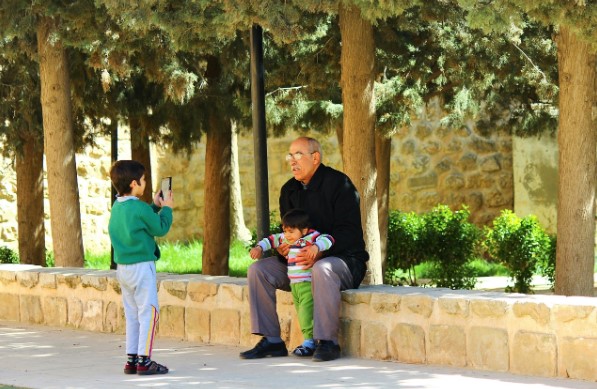Becoming a grandparent is one of the greatest joys of life, and many people are excitedly awaiting this moment. Unlike raising a child, which often comes with a good dose of insecurity, a mountain of responsibility, and the monotony of the daily routine, being a grandparent is often a period of carefree fun, harmless rule-breaking, and indulgence for both the grandchild and grandparents. But what if an autism diagnosis throws a wrench into your plans?
At first, hearing that your grandchild has autism could be a terrifying and perplexing thing to happen. Although there is currently no treatment for autism, it does not imply that your grandchild will not have a long and meaningful life. Families of autistic children have access to educational, medical, and therapeutic support. This is not to say that you won’t face difficulties; what it does indicate is that you are never really alone. In this article, we’ll go through some practical tips for how you might enrich your grandparenting experience and strengthen your relationship with your grandchild.

Teach Your Grandchild to Do Things on Their Own
Help your grandchild build confidence by showing them how to do things on their own instead of always doing it for them. Doing things for children with special needs is enticing, since the words, “You can do it!” might seem harsh when we consider everything that autistic children have to cope with. Being too protective, however, might ruin a child’s chance to learn something new and experience the joy of success that comes with it! The last thing any grandparent wants to do is bring down their grandchild’s confidence. You are giving your grandchildren a gift that will last a lifetime when you help them through each stage and praise their efforts, no matter how clumsy they may be.
Help Your Child
Parenting is challenging enough even without an autism diagnosis. However, as autism statistics confirm, parents of autistic children experience more stress than parents of children with other developmental disorders. Keep an eye on your child and their partner since their actions and words could provide you with clues as to how you might be of most assistance. A home-cooked or delivered dinner could be a godsend for some people. For others, the simple act of being there to spend time with their kid or receiving assistance around the home may be a great stress reliever. Giving parents gift cards to restaurants, movie theaters, or spas is another subtle way to encourage them to leave home and relax (while you babysit the kids).
For your grandchild to be cared for, you must care for your child first. Help before you’re asked. Both your child’s marriage and mental health need your undivided care as does your grandchild. Giving them the chance to relax is an investment for the whole family.
Learn as Much as You Can
Autism is a syndrome that affects a large percentage of the population, although few people understand it. If you want to understand your grandchild’s behavior and have a stronger relationship with them, it might help to learn more about how autistic individuals see the world and communicate.
Rather than concentrating on a cure, your teaching should center on how autism impacts social and other behavioral interactions. Parents and grandparents may feel discouraged if the whole research focuses on finding a cure, but everyone may benefit from a shift in attention to improving communication and relationships with the child. You may find a plethora of information on autism on the websites of several excellent organizations, and some books can be very instructive. Do your homework on them.
Provide Sensory Activities
As a result of difficulties processing sensory information, many autistic children may be overly- or insensitive to certain sensations. Make sure your grandchild has sensory activities that are just right for them. Make a sensory bin with a variety of textures, give them something to hold or push against, or put on some soothing music. Make adjustments to your activities based on your grandchild’s reactions to various sensory stimulation.
Create a Special Place
Create a special place for your grandchild so they have somewhere peaceful to relax when they come to see you. You don’t need a huge place; a drawer, a nook, or even a small section of your garden can suffice. Add some of their favorite items to the section to make it more special. You shouldn’t pour a lot of money into making something just because they have a “strong interest” right now. Their passions shift with time!

Provide Emotional Support
Some of the challenges that children on the spectrum may have include difficulty controlling their emotions, reading social signs, and forming meaningful connections. You may help your grandchild emotionally by being there for them regularly and showing them that you care. Pay attention to what they have to say without passing judgment, affirm how they feel, and provide direction when asked for it. Practice social skills with them, including sharing, taking turns, and showing appreciation, to help them grow as individuals and members of society.
As we come to the end, you should know that every family will deal with the news of a diagnosis in their unique way. You could think it’s better to keep quiet about it so you don’t offend the parents or anybody else in the family. Being concerned that you may say something inappropriate because of your lack of knowledge regarding autism is normal. To avoid giving the impression that you have not accepted the diagnosis, it is best to broach the subject with the parents at the appropriate moment rather than trying to compel them to do so. The family as a whole will benefit from your positive reaction to the diagnosis. Keep in mind that there are many wonderful aspects of being a grandparent, even for a grandchild with autism. Almost without exception, grandparents who are living with an autistic grandchild report that the love and connection they established with their grandchild made all the sacrifices worthwhile.






